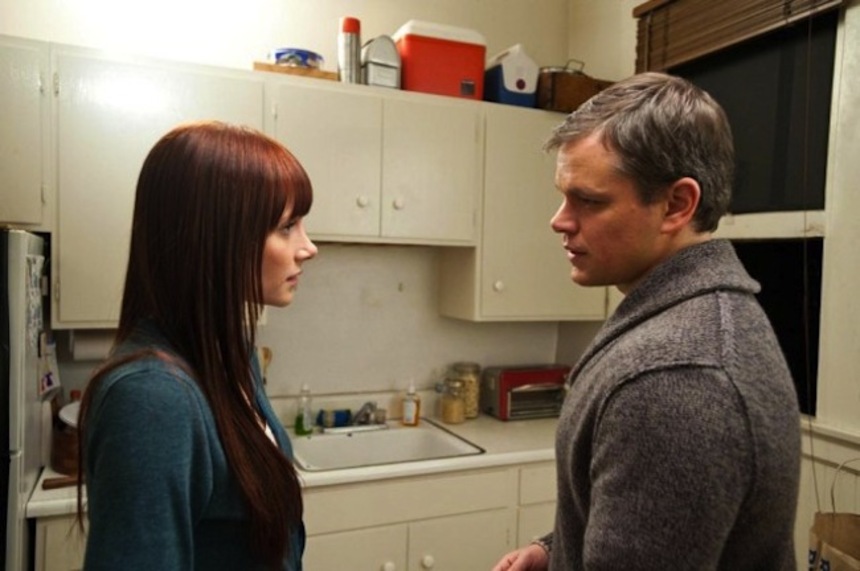NYFF 2010: HEREAFTER Review

The opening scenes of Clint
Eastwood's Hereafter are remarkably deceptive. We are teased
with the possibility of adult, dimensional characters, and storytelling
that respects our intelligence by suggesting things instead of spelling
them out. Couple this with visuals that are at once lush and crisp,
and characters who speak in French, and one can't be blamed for thinking
that someone swapped in a reel from an Olivier Assayas film. Also early
on, Hereafter delivers a natural disaster set piece that, while
not flawless, shows a lot of thought and generates some moments of true
horror and excitement--in other words, real emotion. The remainder
of the movie, however, devolves into one of the most clunky, literal-minded,
and intelligence-insulting pieces of "serious" Hollywood filmmaking
this writer has seen in a long, looong time.
As George Lonegan, Matt Damon
does his best to avoid making his loner, ex-psychic character a cliché,
occasionally supplying some funny line-readings and bursts of charm.
But the script by Peter Morgan saddles him with saying that his ability
to communicate with the dead is a "curse, not a blessing" about
twenty times more than is necessary. (Tip to Morgan: even once
would have been too much--we should sense this.) Damon, though,
is off-screen for long stretches as we follow near-death-experiencer/news
anchor/author Cécile
De France--playing, as in High Tension, a character named Marie--as
she tries to... do what exactly? Make sense of her brush with death
and plot her next career move? If this sounds less than compelling to
you, you'd be right. There's a germ of a movie in here that could
be interesting if there were some genuine dramatic tension. Or maybe
such a premise would just materialize into a banal message movie about
not being narrow-minded about life-after-death, but sadly Hereafter
does not rise even to that level. Finally, there's a third storyline
involving a young London boy who wants to connect with the dead for
personal reasons. Almost every scene in this strand telegraphs forthcoming
events or exhorts us to get out our handkerchiefs, or both.
There are so many problems
with Hereafter that it's hard to single out one in particular,
but I'd say that what really dooms it is the general air of sentimental
predictability combined with a silly, simple-minded approach to bringing
the characters together. The result is sub-Paul Haggis triteness filtered
through a sub-sub-Inarritu "we're-all-connected" sensibility.
It's as though Morgan has seen Crash and Amores Perros
(there's even a character-on-a-billboard motif) far, far too many
times... and Eastwood has seen them not at all. And I'm guessing that
he also hasn't seen the spate of movies and television series dealing
in communicating with the dead that appeared in the wake of The Sixth
Sense over the past decade; otherwise he'd know that there is
absolutely nothing original in Hereafter's treatment of the
topic. Worse still, the film reflects a young child sense's of the
metaphysics of the paranormal: at first the dead simply deliver
verbal messages to the living, and even then only when Damon establishes
direct contact--but when it serves to jazz the lackluster plot, one
of the dead spirits not only predicts forthcoming tragedy but also manifests
in our world to protect one of the characters. Huh? (On our plane of
existence Hereafter is equally shoddy in its logic. For sheer
dramatic effect Marie has an abrupt, in-person confrontation with her
publisher over an issue that in the real world would have been handled
via e-mails, agents, and phone calls long before it came to this.)
Hereafter makes as little
sense in filmic terms. There's a scene at a Swiss hospice that one
can't help but feel is included largely because of the Alpine vistas.
There's also the embarrassingly wooden staging at events such as the
London Book Fair, where Marie moves from a reading to a book signing
with a mechanical sweetness that suggests she's leading pre-schoolers
from building blocks to juice-and-cookies time. Most annoying is the
film's copout in terms of showing us what George actually experiences
when he speaks for the dead. Had we not seen anything at all, but only
his responses to his visions, there might be an interesting ambiguity
at work. But we do see initial subjective flashes--and then
the film unfailingly cuts back to Damon sitting in a darkened room and
stays there, so that we never fully get a sense of "the hereafter"
or what visiting it is like for George. How exactly are the dead telling
him things? What does it sound like, for example? And why are certain
parts of the communication unclear? One might counter-argue that the
movie is about grief and relationships, not about speaking with the
dead per se--except that this isn't true. We simply spend
too much time listening to George explain how he got his powers, watching
charlatans at work, and hearing Marie prattle on about the scientific
evidence for the hereafter. Yet despite all this, there's only a couple
of minutes out of a two-hour runtime devoted to the audience having
any firsthand cinematic experience of the central topic. It's like
deciding to film Seabiscuit and then having your characters only
listen to radio broadcasts of the races, letting the audience catch
a glimpse of a, you know, actual horse for only a minute or two during
each act.
And speaking of horses, I think
I've beaten this dead one quite enough by now. Hereafter is
probably only suited for Eastwood and Damon completists, and even they
are likely to be sorely disappointed.
Limited ticket availability to all Closing Night screenings at NYFF:
Sun Oct 10: 8:15pm (Festival screening/ WRT) Ticket Info >>
Sun Oct 10: 10:00pm (Festival screening/ ATH) Ticket Info >>







